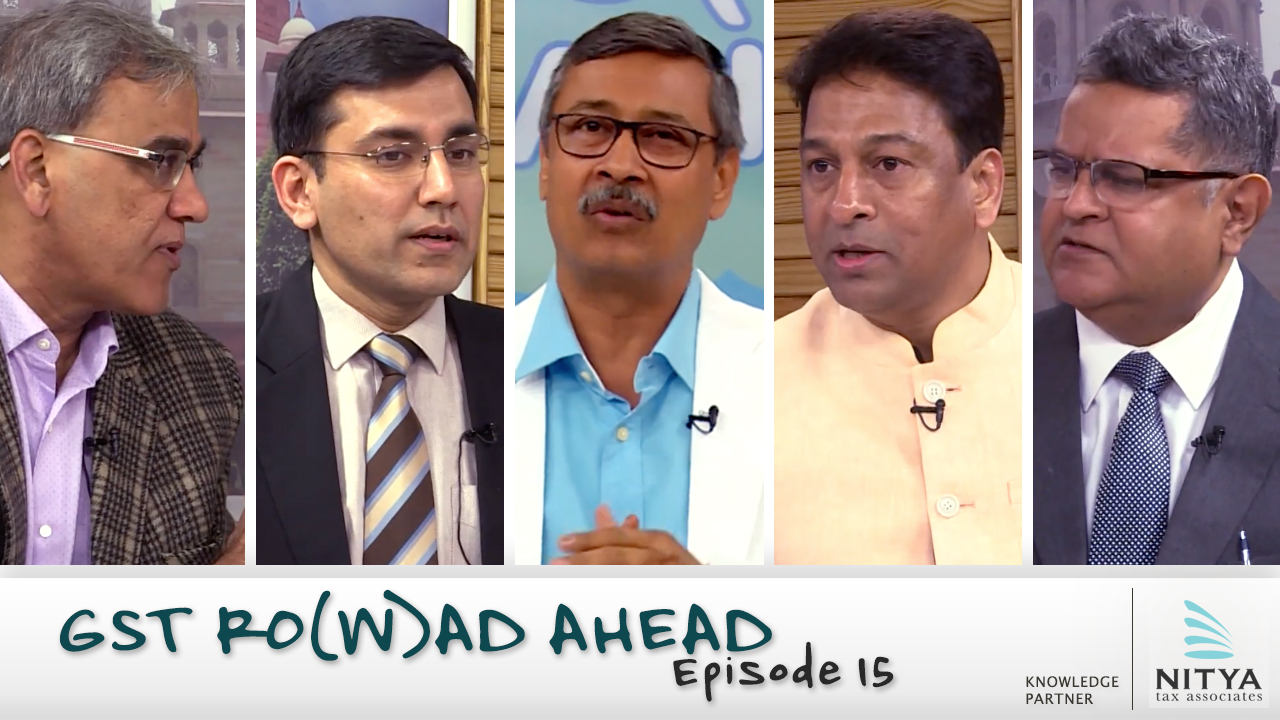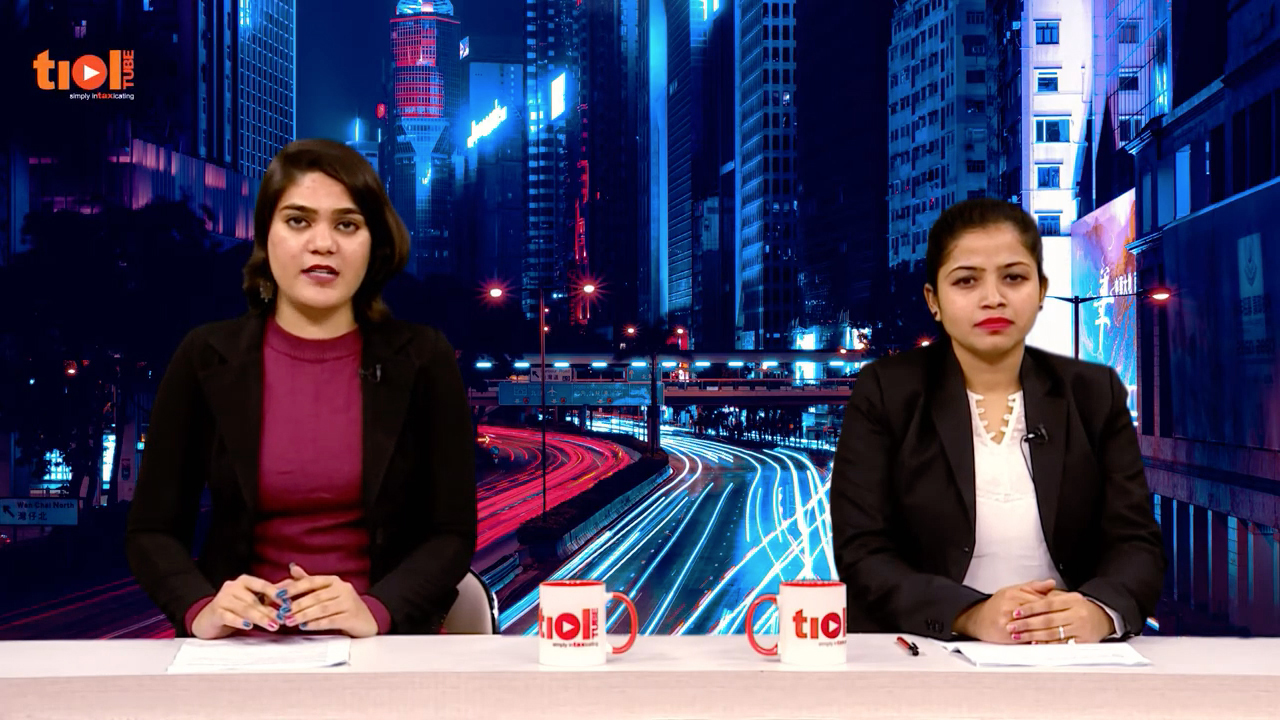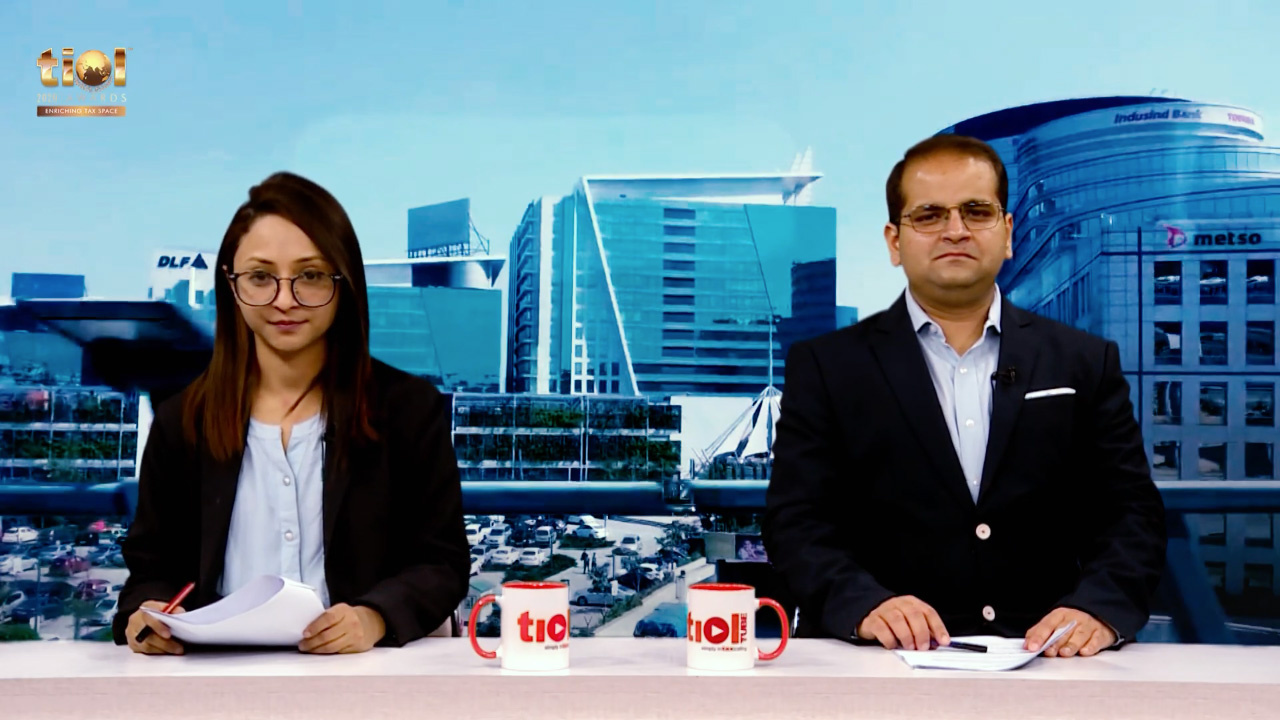|
2020-TIOL-1032-HC-AHM-GST Colgate Palmolive India Ltd Vs State of Gujarat
GST - Petitioner is aggrieved by the SCN issued on 01.06.2020 under Section 129 (3) of the CGST Act/SGST Act and the detention order dated 01.06.2020 under Section 129(1) of the CGST Act / SGST Act, 2017 - It is the say of the petitioner that it applied for single registration number under the CGST Act having the principal place of business as his warehouse at Vadodara and additional place of business as his factory which is located at Ahmedabad in the registered certificate - It is further averred that the Goa Unit had issued the E-way bill incorporating all the details as required in terms of provisions of E-way Rules, however, the address of the place of the delivery in the E-way bill was inadvertently mentioned as Vadodara Warehouse unit instead of factory address of Ahmedabad of the petitioner and, therefore, the truck bearing No. GJ-01-CU-7154 carrying goods mentioned in the invoice issued by the Goa Unit was intercepted on 01.06.2020 for verification on the Ahmedabad Express Highway and because of this mismatch of the place of delivery in the invoice and Eway bill, the goods have been detained and the show-cause notice has been issued - Petitioner have shown the readiness to deposit the entire amount of tax being Rs.14,53,788/- and also have shown readiness to appear before the concerned authority for hearing of the show-cause notice on the scheduled date i.e. on 16.06.2020.
Held: While permitting the petitioner to serve the respondent nos. 2 and 3 both by an e-mode, considering the issue of closure of the business in the pandemic for a long time and also bearing in mind the material which is being carried from Goa Unit of the petitioner to Sanand, Ahmedabad, for preparing one of the necessaries and also noticing that there are two units within the state of Gujarat of the Petitioner registered with the Respondent authorities, Bench is inclined to accede to the request of release of the goods with truck bearing No. GJ-01-CU-7154 detained in exercise of the powers, pending the service of notice and admission of this matter, subject to the deposit of the entire amount of tax of Rs. 14,53,788/- with the department within three days and also the deposit of Rs. 1.45 lakhs, 10% of amount of penalty for now with the department, by way of a bank guarantee, initially for the period of 90 days or till the pendency of Petition, whichever is later - Petitioner shall appear before the authority concerned and shall cooperate with the hearing of the same and the Authorities shall expedite the hearing - On deposit of the amounts as directed, the release of the truck and the goods shall be made within 48 hours - Notice issued returnable on 26.06.2020: High Court [para 9 to 11]
- Notice issued: GUJARAT HIGH COURT
2020-TIOL-1031-HC-DEL-GST
SKH Sheet Metals Components Vs UoI
GST - Petitioner has sought a writ of mandamus directing the respondent to allow it to avail the ITC amounting to Rs.5,51,33,699/- by either updating the electronic credit ledger at their back-end or allowing them to revise the Form GST TRAN-1 inasmuch as the petitioner had apparently failed to fill in the correct details in the right column.
Held: A comparison of the figures reflected in the screenshot with those in the statutory returns reveals that the credit which was reflected in Form 231 under the Maharashtra VAT Act of Rs.101,24,382/- instead of being added to the remaining amount reflected in the tax returns under the Excise Act (ER-1) and Services Tax (ST-3) was instead ‘erroneously' reflected under the heading “CENVAT credit admissible as ITC” - for this clerical mistake, there has been short transitioning of the credit as result whereof, the petitioner stands to lose huge amount of ITC totalling to Rs.5,51,33,699/- that stood vested in its favour under the erstwhile regime – Amendment to Section 140 came to be notified on 18th May 2020, vide notification No. 43/2020 dated 16th May 2020 - This amendment came into force after the date of the decision in Brand Equity (supra) - Since there is no specific challenge to the amendment introduced by Section 128 of the Finance (Amendment) Act, 2020, Bench does not want to venture into legality of the said provision vis-a-vis the judgment of Brand Equity (supra) - Nevertheless, in spite of the amendment, Bench can say without hesitation that the said decision is not entirely resting on the fact that statute [CGST Act] did not prescribe for any time limit for availing the transition of the input tax credit - There are several other grounds and reasons enumerated in the said decision and discussed hereinafter, that continue to apply with full rigour even today, regardless of amendment to Section 140 of the CGST Act - Rule 117(1A) suffers from the vice of vagueness and concept of ‘technical difficulty on common portal' and its applicability has not been adequately defined anywhere - In the absence of a criteria, the application of the provision would suffer from arbitrariness - Office memorandum of GST Council dated 19 th February 2019 indicates that the GST Council recognised that there could be errors apparent on the face of the record that could be non-technical in nature and merit leniency - In line with the spirit of the decision of the GST Council and the blurring thin line between technical and non-technical difficulty, keeping in view that the entire filing is electronic, Bench finds that the restrictive applicability of Rule 117(1A) is arbitrary as is demonstrated in the facts of the present case - An uninterrupted and seamless chain of ITC is the heart and soul of Goods and Services Tax - The transitional provisions and the language of section 140 of the Act, in particular, even after amendment, manifests the intention behind the said provision is to save the accrued and vested ITC under the existing law - This is the reason that the Courts have held that CENVAT credit which stood accrued to the petitioner is a vested right and is protected under Article 300A of the Constitution of India and could not be taken away by the Respondents, without authority of law, on frivolous grounds which are untenable - The purpose of the timelines prescribed is just to hasten the migration of taxes from the erstwhile regime to the new GST laws and for swift streamlining of the ITC - The timeline introduced by Rule 117 is purely procedural and the same was not treated as sacrosanct, the Central government having continuously extended the same, by carving out an exception under rule 117(1A) - Bench also cannot decipher any intent to deny extension of time to deserving cases where delay in filing was on account of human error - such interpretation would run counter to the object sought to be achieved u/s 140 of the Act which is the governing provision and exhibits the true legislative intent - after the retrospective amendment of Section 140, it can be interpreted that the power to fix the timeline and its extension has been prescribed to the Central government which was done vide rule 117 - under rule 117(1A) multiple extensions beyond 180 days have been granted for taxpayers who faced ‘technical difficulties on common portal' yet deserving ‘non-technical' cases like the present one have been ignored and this exclusion is arbitrary and irrational - moreover, there is no provision in the statute that would stipulate a consequence for failure to adhere to the timelines - rule 117 also does not indicate any consequence for non-compliance of the condition - Both the Act and the Rules do not provide any specific consequence on failure to adhere to the timelines - since the consequences for non-compliance are not indicated, the provision has to be seen as directory - If the timelines are interpreted as mandatory, the failure to fulfil the obligation of filing TRAN-1 within the stipulated period would seriously prejudice the taxpayers for whose benefit section 140 has been provided by the legislature - Interpreting the procedural timeless to be mandatory would run counter to the intention of the legislature and defeat the purpose for which the transitory provisions have been provided and have to be construed as directory and not mandatory - In the instant case, the Form TRAN-1 was filed promptly, within the stipulated period and when the petitioner noticed that the entire credit had not been transitioned, they started corresponding with the respondent with the hope that the matter would be resolved and the mistake would be rectified, however, petitioner's case was differentiated on the ground that the petitioner faced no technical glitch at the stage of filing the form TRAN-1, in which case the petitioner's case does not qualify for any relaxation - Visibly, there is an error apparent on the face of the record - TRAN-1 form was filed within the stipulated period and revision thereof, to correct an error, will relate back to the said date of filing - There is no convincing reason to hold that as on date, the revision of the said return will be time-barred and treated to be a fresh return - Revised data can be easily verified and correlated with the tax returns filed in the erstwhile regime - In fact, Rule 120A of the CGST Rules is an enabling provision that can be resorted to by the taxpayers to revise the form GST TRAN-1 on the common portal within the time specified in the rules or such further period as may be extended by the Commissioner - In the present case, the mistake was clerical in nature and it is the respondents who have, for specious reasons, denied this opportunity to the petitioner - Revision cannot be treated as a fresh filing, especially keeping in view the spirit of the 32nd meeting of the GST Council - Restriction that prevents the petitioner from taking the entire credit by revising the return, based on the footing of a “human error” and not “technical difficulty on common portal” is wholly unreasonable, being irrational and arbitrary and, therefore, violative of Article 14 of the Constitution - Viewed from another angle, one can construe Petitioner's difficulty as technical in nature as the short credit is reflected as blocked credit on the portal with no provision to rectify the same electronically - GST laws required taxpayers to embrace transformative new ways - The use of technology can be daunting for many taxpayers who hitherto before, were largely dependent on conventional manual filings of returns - In order to overcome the resistance to change and encourage transformation and remodelling of the entire accounting structure at taxpayers' end, the electronic mode should be user friendly but sadly the respondents have not helped the situation, despite all the good intentions they may have - The exactness required in compliance of tax provisions should not be construed so rigidly that permissible flexibility is completely disregarded - In fact, the ITC has been expropriated without any lawful sanction - Instead of offering a restitutive solution, Respondents have stonewalled all the attempts made by the petitioner - Stand of the Respondent which is founded on some illogical understanding of the Rules cannot be upheld - Bench adds that it has time and again made adverse remarks on the procedural working of the GST system in several decisions and that it (Bench) does not derive any pleasure when it makes such observations as comments of the Court affect the reputation of the administration in the Country - Only if the Respondents were to engage with the taxpayers with a genuine intention to solve the problems, confidence in the system can be built up and such matters would not reach the courts - Petition is allowed and petitioner is permitted to revise TRAN-1 form on or before 30.06.2020 and transition the entire ITC, subject to verification by the respondents - Bench also issues a writ mandamus to the Respondents to either open the online portal so as to enable the petitioner to file revised declaration TRAN-1 electronically or to accept the same manually - Petition is allowed: High Court [para 19, 20, 23 to 30] - Petition allowed: DELHI HIGH COURT
2020-TIOL-1030-HC-KOL-GST
SMVD Polypack Ltd Vs Commissioner of CGST & CX
GST - Petitioner submits that the website concerned of the respondent department is not functioning properly and, therefore, they are not able to file an online application regarding its GST transition credit, last date for which is fixed as 30 June 2020 - That, therefore, they pray that they be allowed to present the application prior to such cut-off date, if necessary, manually.
Held: None appears for the respondent - In view of the innocuous nature of the order proposed to be passed, no prejudice would be caused to the respondents, in any event - Petition is disposed of by directing the respondents to accept manual filing of the GST Transition Credit applications as well as to reopen the website concerned, enabling all applicants, including the petitioner, to file such applications prior to June 30, 2020 - authorities to act on urgent basis in view of the emergent pandemic situation so that the online portal is opened for such filing at the earliest, positively before June 30, 2020: High Court
-Petition disposed of : CALCUTTA HIGH COURT
2020-TIOL-1029-HC-KAR-GST
Sri Hanumanthappa Pathrera Lakshmana Vs State
GST - Petitioner is a dealer in ferrous and non-ferrous scrap and has purchased goods from various registered and unregistered dealers and issued tax invoices as per law - Petitioner has been issued notice/summons to appear before the Authorized Officer on 12.05.2020; that before filing the petition and after filing the petition, another summon has been issued - Petitioner has filed petition u/s 438 of the CrPC for grant of anticipatory bail - Petitioner submits that in case he is arrested and sent to judicial custody, he will be put into hardship and irreparable loss as he is having a old age mother and also a daughter and due to COVID-19 lockdown situation, his health may affect; that even though, he has not committed any offence, there is likelihood of his arrest for the non-bailable offence; that he is ready to abide by any condition imposed by this Court and he is ready to offer any surety - Counsel for Revenue submits that if the bail is granted to the petitioner, he will destroy the evidentiary material and other documents; that the anticipatory bail is not maintainable and it is pre-mature; that in similar cases, the Telangana High Court has dismissed the petitions in P.V.Ramana Reddy - 2019-TIOL-873-HC-TELANGANA-GST which was upheld by the Supreme Court by dismissing the SLP and the Supreme Court has reaffirmed P.V.Ramana Reddy's case in the case of Union of India vs. Sapna Jain and Others - 2019-TIOL-217-SC-GST and hence the bail petition be dismissed.
Held: Telangana High Court in P.V.Ramana Reddy (supra) has held that writ petition under Article 226 of the Constitution of India in the matter of pre-arrest bail is maintainable, but on the merits, the writ petitions were dismissed as huge amount of tax evaluation was involved in the said case - Even otherwise, the Telangana High Court has not held that Section 438 of the Cr.P.C. bail application is not maintainable in the case of the offence which is punishable under the CGST Act - It is relevant to mention that as per the provisions of Section 70 of the CGST Act, the Officer has power to summon any person whose attendance is considered as necessary either to give evidence or to produce document or any other thing in any inquiry in the same manner as provided in the case of Civil Court under the provisions of the Code of Civil Procedure, 1908, and every such inquiry referred to subsection (1) shall deemed to be "judicial proceedings" within the meaning of Section 193 and Section 228 of the Indian Penal Code - Special Public Prosecutor for the respondent fairly admits that there is no statutory bar in the CGST Act either expressly or impliedly for entertaining the bail petition under section 438 of the Cr.P.C - Once a person apprehends his arrest in the hands of the Commissioner under Section 69 of the CGST Act, the assessee has a statutory right to seek anticipatory bail under Section 438 of the Cr.P.C - Therefore, the petition under Section 438 of the Cr.P.C. is maintainable for the offences committed under the CGST Act and there is no statutory bar for invoking or exercising power under section 438 of the Cr.P.C. for the offence committed under the provisions of the CGST Act - It is alleged by the prosecution that the petitioner is said to have involved in fraudulent input tax credit on the basis of invoices without actual supply of goods in contravention of Section 16 of the CGST Act and caused loss to the exchequer for Rs.9.05 crore approximately - Therefore, summons have been issued by the authorized officer under Section 70 of the CGST Act which clearly goes to show that the petitioner is reasoned to believe that he is apprehending his arrest in the hands of the respondent in case after his appearance before the authorized officer as per Section 69 of the CGST Act - In case the petitioner is arrested, he is likely to be remanded to judicial custody after his production before the Magistrate and by looking to the present COVID-19 situation, if he is remanded to the judicial custody, he will be put to hardship and definitely, his health would likely be affected - The offences are not punishable with death or imprisonment for life - There is no statutory bar in the CGST Act for granting anticipatory bail by exercising power under Section 438 of the Cr.P.C - Merely, there were number of notices/summons issued by the respondent during the lockdown for COVID-19 that itself is not a ground to reject the bail petition - if an anticipatory bail is granted, no prejudice would be caused to the respondent - petitioner is ordered to be enlarged on bail in the event of his arrest under Section 69 of the CGST Act subject to conditions laid down in the order: High Court [para 10, 12, 13, 15, 16, 17]
-Petition disposed of : KARNATAKA HIGH COURT
2020-TIOL-1028-HC-P&H-GST
Tarun Bassi Vs State of Punjab
GST - Petitioner is proprietor of M/s Broadway Sales Corporation engaged in the business of trading in iron and steel products - Petitioner was arrested on 25.09.2019 u/s 69 of the Punjab GST Act on the allegation that the petitioner had passed on Input Tax credit by issuing sale bills to various parties without supply of goods - petitioner was granted interim bail on 18.02.2020 and the bail application is pending for 07.08.2020 and the trial is at the stage of pre-charge evidence since last 08 months and till date no witness has been examined - Petitioner challenges the vires of section 69 and 132 of the Act, 2017 by submitting that as per the Scheme of the Constitution of India there are two sources from which power to legislate follows viz. Schedule VII r/w Article 246 and a specific Article for example Article 35, 323B, Article 369; that Article 246A inserted w.e.f 16.09.2016 empowered the Union and State Legislatures to levy tax on goods and services; that the power to levy tax includes the power to make law with respect to ancillary and incidental matters, however, the power of arrest and prescription of sentence are neither covered under ancillary and incidental matters; that the provision for arrest or sentence for an offence against the law may be inserted in any enactment, if permitted, by the Constitution; that the criminal trial for the offences under section 132 of the Punjab GST Act, 2017 as also the arrest u/s 69 are without jurisdiction having no backing of the constitutional provisions.
Held: Bench finds considerable force in the submissions raised by the petitioner - Notice of motion is fixed on 30.07.2020 - Trial Court is directed to adjourn the case beyond the date fixed by the High Court: HC - Matter listed :
PUNJAB AND HARYANA
HIGH COURT
|
|








